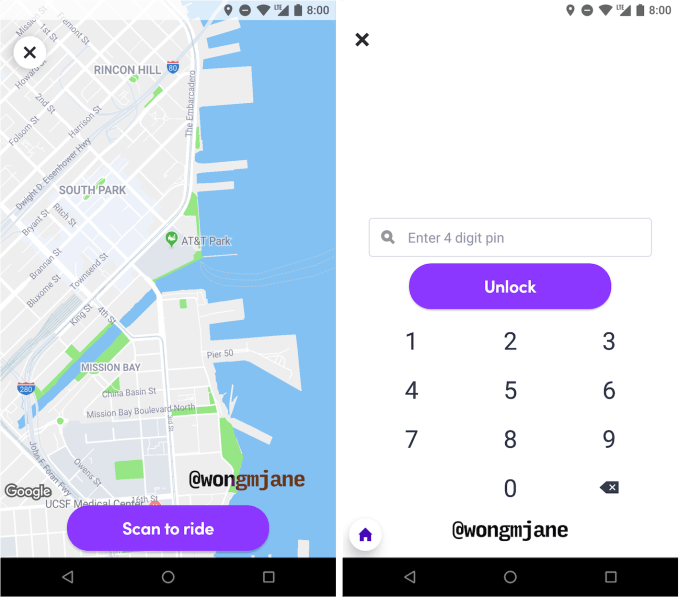Lyft hasn’t acquired a bike-sharing startup or gotten a scooter permit yet, but it’s already preparing its app for them with a feature codenamed “last mile”. Code and screenshots dug out of Lyft’s Android app reveal a way to search a map for last mile vehicles, and scan a QR code or enter a pin to unlock them.
These materials come to TechCrunch from Jane Manchun Wong, who’s recently established herself as a prolific app code investigator. Her work has led to TechCrunch scoops on Instagram video calling and Usage Insights, Twitter encrypted DMs, and Facebook’s personalized emoji Avatars that were confirmed by the companies.

Lyft’s entrance into last mile vehicles could win customers looking for quick, cheap, and exciting transportation beyond the longer car trips it already offers. Renting scooters or bikes from the same app as its car rideshare options would allow it to compete with dedicated last mile provides like LimeBike and Bird that don’t benefit from the customer cross-pollenation. It would also help it keep up with Uber, which recently acquired electric bikeshare startup JUMP.
The screenshots show a map you can browse to find nearby vehicles plus a “Scan to ride” button. That brings up a barcode scanner for unlocking the vehicle, though there’s also an option to enter 4-digit pin code on your phone for unlocking. Code reveals that vehicles can have status of ‘Idle, Unlocking, In Ride, Locked, or Post Ride’.
Lyft is one of a dozen companies the SF Chronicle reports have applied for five dockless scooter permits from San Francisco Municipal Transportation Agency. Regarding these new in-app materials, a Lyft spokesperson told TechCrunch “As has been reported I can confirm that we’ve submitted an application to the SFMTA but we aren’t sharing any further details at this time.
Lyft is vying for a permit alongside Uber, Spin, LimeBike, Bird, Razor, Scoot, Ofo, Skip, CycleHop, Ridecell, and USSCooter. SF recently banned scooter rentals after an unregulated invasion by several of these companies saw the vehicles strewn in sidewalks, obstructing pedestrians.

Lyft’s Android code includes new “last mile” features
Meanwhile, The Information reports that Lyft is in talks to acquire Mobike, offering $250 million or more for the startup that operates NYC’s Citibikes, and SF’s Ford GoBikes. But Axios reports Uber is trying to muscle in with its own bid, which could block Lyft or at least force it to pay a higher price. Lyft already offers bike rentals in Baltimore, but only through the Baltimore Bike Share app, not its own.
Some might see all this premature, with scooter rentals existing in few cities and considerable backlash from some citizens. But given the alternatives are either slow walking, or ridesharing that can increase traffic congestion, create more carbon emissions, and be quite expensive for short trips, many who give scooters a shot are finding them quite pleasant.

A driver displays Uber and Lyft ride sharing signs in his car windscreen in Santa Monica, California, U.S., May 23, 2016. About a half dozen ride-hailing firms have rushed into Texas tech hub Austin after market leaders Uber and Lyft left the city a little over a monthago in a huff over municipal requirements that they fingerprint drivers. REUTERS/Lucy Nicholson/Files
Hopefully, cities will focus on giving permits to dockless bike and scooter companies willing to incentivize proper parking, bike lane riding, and helmet usage, and that build reliable hardware that doesn’t end up broken or out of battery on the streets. Given Lyft’s more cooperative brand in comparsion to Uber’s more confrontational style, it could leverage its public perception to gain access to markets with these vehicles.
If those permits or acquisitions come through, Lyft clearly wants to move fast to get last mile transportations in customers’ hands and under their feet.

0 comments :
Post a Comment